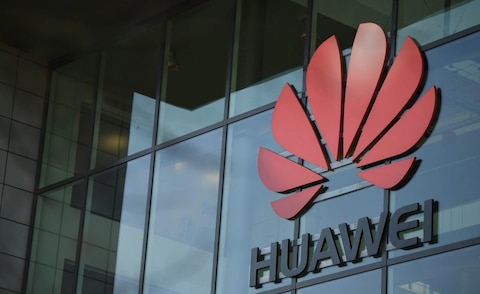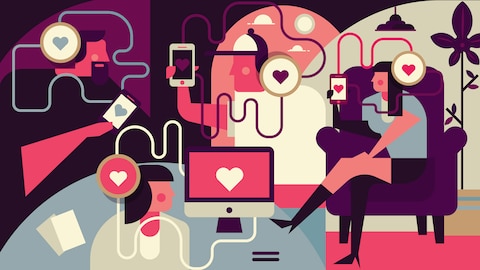Analysis | The Technology 202: Here’s how tech is keeping us sane while we stay home – The Washington Post

Naomi and her husband Doug Hassebroek enjoy a happy hour from their home on March 20 using Zoom to connect digitally at the end of their first Friday working from home in Brooklyn. (Caitlin Ochs/Reuters)
Ctrl + N
Most of The Washington Post staff has been working from home and practicing social distancing for more than two weeks. Tech has been helping many of us stay sane as we try to protect ourselves from getting and spreading coronavirus.
Editors and reporters on our tech and PowerPost newsletter teams weighed in on their favorite products and services for a special edition of today’s newsletter. We hope this list can help some of you during this difficult time. If you have your own recommendations, email me or share them on Twitter, and we might share them in a future newsletter.
Some reporters are discovering new parenting hacks as they work from home with kids.
Heather Kelly, who reports on the ways tech affects everyday lives, is using an AirPod. Just one: “Consider using an AirPod to listen to podcasts or music in one ear while taking care of your kids. Some of us aren’t used to keeping our kids entertained all day long, every day, in a small space, while doing a full-time job. One coping mechanism for the less hands-on moments is to distract your brain with the latest ‘You’re Wrong About’ podcast or listen to soothing music in one ear. It avoids arguments from children who want to listen to the Sing soundtrack, and you still have one ear free to hear them fighting or trying to strike a match near the cat.”
Reed Albergotti, consumer electronics reporter, says he has loosened screen time restrictions for his young children: “My wife and I are both working from home and taking care of a 2-year-old and a 4-year-old. So far, we’ve found no technology that can stop them from trying to kill each other if you leave them unattended for more than 30 seconds. We’ve relaxed all screen time standards and use any opportunity we can to distract them, even just to buy enough time to clean a few dishes or get some work done. We have had some video playdates with friends and a Zoom call with our 4-year-old’s preschool class.”
They’re finding new ways to support family from afar.
Sara Sorcher, PowerPost deputy editor, is shopping for her grandparents: “I’m ordering my 90-year-old grandparents groceries over Amazon’s Whole Foods delivery and Instacart, which has been an adventure given the difficulties scheduling deliveries and shortages of key items, but somehow still astonishing that my clicks here in Washington bring real food to them 300 miles away.”
Shefali Kulkarni, operations editor for the financial and tech section, is coaching older relatives to use tech: “I have an 82-year-old aunt who lives in remote New Hampshire. She’s been wanting to connect with our family around the world, and WhatsApp has been her best tool. I have been teaching her how to use WhatsApp video chat — and she’s a natural. Any person with family outside the U.S. uses WhatsApp and in these insane times it’s been a big part of weekend family chats and check-ins.”
Elizabeth Dwoskin, Silicon Valley correspondent, is using FaceTime to make sure her family doesn’t miss her baby’s milestones: “We’ve been doing FaceTime hangouts for the first time with my entire family in Florida. I think we feel sad because we don’t know when we will get to visit them again and we have a new baby, so the travel-ban means they miss so many moments of his growing up.”
We’re discovering ways to avoid stress and keep ourselves entertained.
Jacqueline Alemany, Power Up newsletter author, is embracing the influencer economy. “I’m now cooking Alison Roman recipes as a new NYT cooking app subscriber and have been doing Megan Roup sculpt society classes. Pairing pasta with dance cardio like a dutiful millennial.”
Rachel Van Dongen, PowerPost editor, is turning to podcasts. “I recently got AirPods (I know I am super late to that game) and I’ve been listening to true crime podcasts on Spotify while on long walks outside. Highly recommend the new podcast “The Killing of Jon Benet Ramsey.”
Tonya Riley, Technology 202 and Cybersecurity 202 researcher, is embracing e-books from the library. “I normally buy books instead of checking them out from the library. But as I try to cut down on my delivery footprint, I’ve been relying more on apps like Axis360, Hoopla and Overdrive that help you download books (and comics and movies) from your local library for free.”
Brent Griffiths, Power Up and Finance 202 researcher, is watching Netflix with friends. “The most ambitious thing I’ve tried to do is long distance TV/movie watching. There’s a great Chrome extension called Netflix Party that helps sync up whatever you’re watching, so you’re not always ahead of/behind your friends. I know it’s a little thing, but I’ve just found it so annoying when that happens. I hope if this all isn’t over soon that the other streaming services can add more features like that — honestly, it’s kind of surprising that they’re not already built-in.”
Sara is trying online classes. “I’m studying piano, and moved my lessons to FaceTime since starting social distancing. Our Mozart duet is not as sophisticated as this symphony orchestra performing remotely but it’s amazing to have the technology to continue learning — and keep supporting the studio’s business. My husband and I are doing a 30-day yoga class over Amazon Prime, but not at the same time, because we can’t fit two yoga mats in our office together.”
I’m using my Sonos speakers more than ever. My apartment can get pretty quiet, but I’ve found asking Alexa for a steady stream of podcasts or Spotify playlists can keep me entertained and relaxed. If you need a pick-me-up, try this special “Alone Together” episode of The Daily.
Some of us are turning to video games.
Mariana Alfaro, The Daily 202 researcher, has her Nintendo Switch: “I’ve also been using my Nintendo Switch more than ever before, and the highly-anticipated game Animal Crossing dropped on March 20 so it was perfect timing. You can download games from the Nintendo Store, so I didn’t even have to break quarantine to go to the store and get it.”
Heather recommends kid games on your phone. “I’m sure there are lots of soothing games made just for adults, but when the anxiety threatens to take over I like to play a kids’ game: Toca Boca Hair Salon. You give the cute animated characters haircuts or change their color. In the game you can curl, grow, straighten, shave and wash. It is my meditation.”
My co-workers are serious about their home offices.
Geoffrey A. Fowler, technology columnist, is loving his setup: “I’m so thankful right now that I have a big screen to work on, my fancy Jony Ive-approved work chair and a light to put behind my webcam so I look good during video chats.” Yes, Geoff bought the same chair that employees use at Apple HQ.
Laura Stevens, deputy tech editor, is making some upgrades: “I’ve combined my MacBook and iPad to replicate the two-screen feel at the office. I also had to go retro: I finally broke down and bought a printer, but it is wireless and runs with an app.”
Post reporters and editors are finding many new use cases for video chat.
Christina Passariello, tech editor, says Zoom has become her main social connection: “I’ve had hangouts with friends from all over the world who I haven’t seen in far too long. The gallery view is great, even if you’re just doing it with one other person. And so many of the kids’ after-school activities are setting up virtual basketball, soccer trainings, hangouts and other creative learning things using Zoom and other services.”
Mariana is going Gen-Z and using the Houseparty app: “It was a bit confusing at first but with help from my teen sister I got the hang of it — it’s more fun than FaceTime because you can play games and any online friends can drop in.”
Joseph Marks, Cybersecurity 202 author, is having virtual happy hours. “I’ve had video chat drinks with two sets of old friends. But, honestly, I’ve been doing that for years — inspired by mom who often has drinks on the phone with out-of-town friends. They call it ‘wine and whine’ and must be ahead of their time.”
Laura goes to a Zoom hangout almost every evening. “I was invited to an international dinner party, an office reunion and even sang Happy Birthday with my family to my nephew, who just turned one.”
Elizabeth tried a FaceTime double date. “Among my friend group, there have already been several zoom dance parties, karaoke nights, double dates over FaceTime with myself and a couple we are close friends with in Atlanta, and two friends are offering free Pilates and yoga classes to the community. Somehow people are keeping very busy, always checking in a way that would not have happened in normal times.”
BITS, NIBBLES AND BYTES
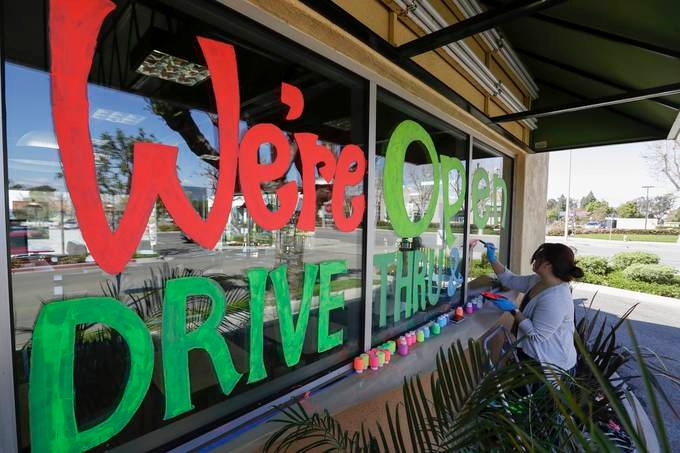
Lucy Kwak paints a sign Thursday on the window of a fast-food chain’s restaurant indicating that the drive-through window is still open as well as a takeout option during the coronavirus outbreak in Garden Grove, Calif. (Chris Carlson/AP)
BITS: Small businesses, nonprofits and families are turning to fundraising platform GoFundMe to seek financial relief from the coronavirus pandemic, Nathaniel Popper and Taylor Lorenz at the New York Times report. Just between March 20 and March 24, the number of campaigns on the site increased by 60 percent, and donors contributed $60 million to coronavirus-related campaigns, the company said.
But the rapid increase in campaigns has made it even more difficult for most individuals to meet their goals.
“If this were any other time, I would have had maybe $4 million right now,” said Yashar Ali, a journalist who has raised just under half of his goal for a $1 million campaign to help hourly workers hit by the pandemic. Even in normal circumstances, just over 25 percent of fundraisers meet their goals, researchers have found.
Some small business owners don’t feel like they have any other choice amid uncertainty over when government assistance will hit their bank accounts.
“The government has not been helping us, so we are left with the devices we have at hand,” said Colt Taylor, a Connecticut business owner who set up a GoFundMe account to raise money for his unemployed staff.
Others have questioned whether GoFundMe’s practices are in the best interests of small businesses. The company, which makes money off processing fees for donations, partnered with Yelp to allow businesses to launch GoFundMe accounts directly from their pages. But some business owners say fundraisers were launched without their permission.

Zoom. (Mark Lennihan/AP)
NIBBLES: Zoom’s Apple app is sending user analytics data to Facebook — even if users of the increasingly popular video software don’t have an account with the social network, Joseph Cox at Motherboard reports. The potentially invasive feature highlights how a rapid rise in Internet use during the coronavirus crisis is raising new privacy and surveillance concerns for users.
Facebook has similar partnerships with a number of apps, as my colleague Geoff has reported. But the fact that Zoom’s policy doesn’t explicitly mention sending data to Facebook for users who aren’t on the social media platform is misleading, some privacy experts say.
“That’s shocking. There is nothing in the privacy policy that addresses that,” Pat Walshe, an activist from Privacy Matters, a data protection firm in the United Kingdom, told Joseph. Activists also raised concerns that Zoom hosts can monitor guests’ behavior during the call without notifying them.
Zoom did not respond to Motherboard’s request for comment.
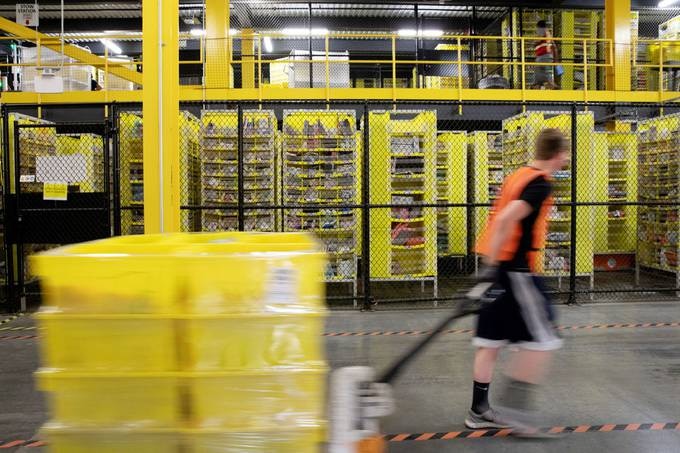
An employee pulls a pallet jack carrying plastic crates past goods in storage units at the Amazon fulfillment center in Robbinsville, N.J., in June 2018. (Bess Adler/Bloomberg News)
BYTES: Kentucky Gov. Andy Beshear (D) ordered Amazon to close a warehouse where three workers tested positive for covid-19, Bloomberg News’s Matt Day reports. It’s the first instance of government officials stepping in to prevent the retailer from operating during the epidemic.
Amazon originally planned on reopening the Shepherdsville warehouse just 48 hours after it identified three sick workers. The warehouse will now stay closed until April 1.
The disease has spread to at least 10 Amazon warehouses in the United States — nearly all of which have reopened — my colleague Jay Greene reports. But Amazon provided workers with little information about the infections and failed to take proper safety measures to protect them, some workers tell Jay.
Members of Congress and state attorneys general have also criticized how the company has handled its response to the coronavirus pandemic and urged chief executive Jeff Bezos to increase efforts to protect workers. (Bezos owns The Washington Post.)
PUBLIC CLOUD
— News from the public sector:
Exclusive: U.S. prepares crackdown on Huawei’s global chip supply
Senior officials in the Trump administration agreed to new measures to restrict the global supply of chips to China’s Huawei Technologies, sources familiar with the matter said, as the White House ramps up criticism of China over coronavirus.
Reuters
Record Jobless Claims Are Overwhelming States’ Aging Tech
Laid-off workers struggle to file claims for unemployment benefits; economists say the situation will likely get worse.
Wired
PRIVATE CLOUD
— News from the private sector:
‘The Human Brain Is Just Not Meant to Process This Much Extreme Change’
Welcome to Sick Days, a series documenting how jobs are changing during the coronavirus pandemic, as told by workers themselves. This week, we hear from an Amazon worker in one of the company’s many delivery stations, an out-of-work Waymo operator, a psychotherapist who has moved to telemedicine, and more.
Gizmodo
Huawei joins China’s Big Tech donation spree in Europe
The company, locked in a controversy over 5G security, says face mask donations are ‘not about getting a PR boost.’
Politico Europe
FAST FWD
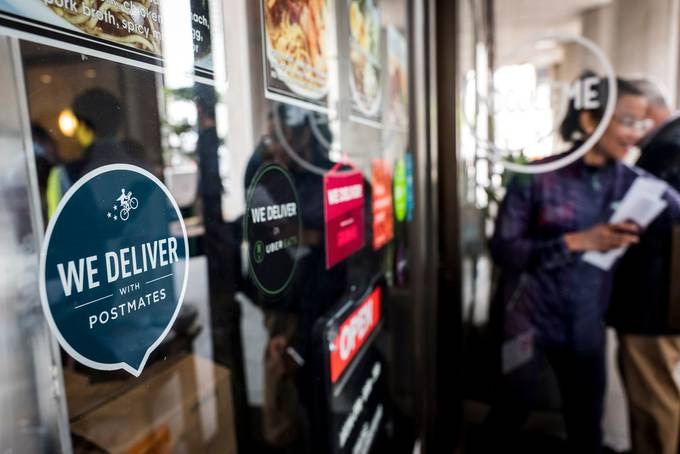
Signage for Postmates Inc. (David Paul Morris/Bloomberg)
The New York Court of Appeals ruled that Postmates couriers are employees of the company, reversing an earlier lower court decision, Erik Larson at Bloomberg News reports. The ruling is a major victory for gig workers in the state, labor advocates say.
“The Court of Appeals has confirmed what we have said all along — app-based employers have been misclassifying workers and denying them their rights for no other reason than their own bottom-line,” Mario Cilento, president of the New York State AFL-CIO, said in a statement. “The harm caused by this injustice has never been clearer than during this pandemic.”
“The courts have solidified what we all have known for a while — delivery drivers are employees and are entitled to the same unemployment benefits other employees can obtain,” said New York Attorney General Letitia James.
Postmates said it disagreed with the ruling, Erik reports.
— More news about the tech workforce:
Gig Workers Release Tool to Calculate Stolen Wages and Unpaid Expenses
“This is about correcting what they have been stealing from us — and enforcing the law.”
Vice
#TRENDING
Technology
Suddenly Nextdoor is filled with kind neighbors. But also new kinds of shaming.
The social network for neighbors, Nextdoor, is seeing an influx of helpful offers during the coronavirus outbreak, but still has its classic, less kind posts.
Heather Kelly
Internet Culture
The ultimate guide to which socializing app is right for you, from Zoom to Netflix Party
From Google Hangouts to Houseparty, here are the apps that are most useful for happy hours, game nights and dance parties while self-quarantining.
Travis Andrews
@MENTIONS
- Jeffrey D. Zients will not seek reelection as independent director of Facebook’s board, the Wall Street Journal reports. Robert Kimmitt, a former deputy Treasury secretary under President George W. Bush, will now lead independent director.
CHECK-INS
- The Stanford Institute for Human-Centered AI will livestream its COVID-19 and AI conference on Wednesday from 9am- 4pm PT.




